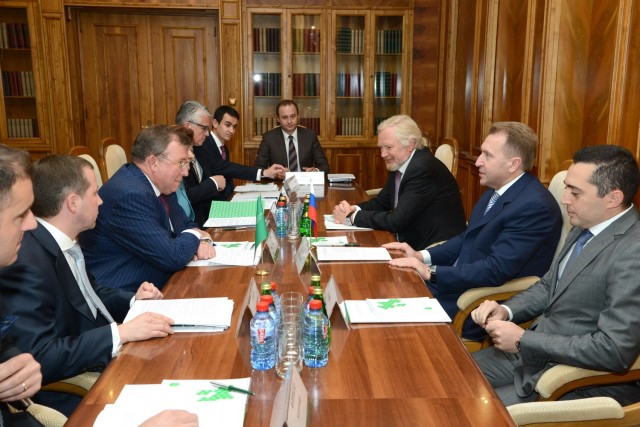First Deputy Prime Minister of the Russian Federation I. Shuvalov visits IIB’s headquarters

Yesterday, First Deputy Prime Minister of the Russian Federation Igor Shuvalov held a meeting with the members of the Board of the International Investment Bank (IIB) at the Bank’s headquarters in Moscow. Together they discussed IIB’s prospects and results of its reform launched in 2012 as well as the implementation of the most important projects with Russian participation.
The renewed IIB is reoriented towards project finance with an emphasis on supporting small and medium-sized businesses, export-import operations and infrastructural projects. IIB’s Chairman, Nikolay Kosov, informed I. Shuvalov that “since the end of 2012, the Bank has signed investment agreements totalling almost EUR 640 million and has increased its assets by more than 100% while continuing to grow steadily. The IIB has expanded geographically by admitting Hungary as a new member and opening the first representative office in its history – European Regional Office in Bratislava”.
Igor Shuvalov emphasized the Bank's successes over the past years, especially in relation to setting up a modern risk management system and expanding its portfolio of support provided to small and medium-sized businesses.
Meeting with IIB’s management, the First Deputy Prime Minister called for the implementation of a strategy aiming to create an entirely new financial platform with new capacity and possibilities for entrepreneurs in the member states. "It is important to raise the bar in relation to the tasks the Bank is facing," – he said. According to Igor Shuvalov, it is necessary to focus not just on individual projects or trade support and loan disbursements, but also on providing expertise and intellectual assistance. “You should become market integrators, market-makers, who provide financial and information services at every level of business," – noted Igor Shuvalov.
The discussion separately focused on the Bank's activities on capital markets, driven by investment grade ratings assigned by Moody's (Baa1), Fitch (BBB-) and Dagong (A). Over the past two years, the IIB has attracted more than EUR 500 million in long-term financing, including – for the first time in its history – bonds placements, becoming an active issuer in Slovakia, Romania and especially Russia (RUB 14 billion of issued bonds).
For the Bank's member countries, among which Russia is as a major shareholder with a nearly 48% share in the paid-in capital, IIB represents an integration platform and equally supports development in each of them. Thus, during the past three years the Bank has signed loan and guarantee agreements for more than EUR 120 million in Russia, with an additional support for Russian exports in relation to overseas projects worth USD 80 million.
Russia continues to provide consistent support for the Bank’s development. In 2014, the country made a EUR 10 million additional contribution to IIB’s paid-in capital and signed the Bank’s new statutory documents the same year. Their ratification will increase its authorised capital to EUR 2 billion and will formally bring the reform launched in 2012 to a conclusion. The IIB also signed a Memorandum of Understanding with the Russian Ministry of Foreign Affairs and the Ministry of Economic Development, has been included in the national project finance programme, actively participates in the initiative to establish the international financial centre in Moscow and recently registered a RUB 100 billion bond programme at the Moscow Stock Exchange, first among IFIs.
Currently, one of the Bank’s key objectives is to prepare its development strategy for the 2018-2022 period, which will be the basis for its sustained growth in the short to medium-term outlook.
